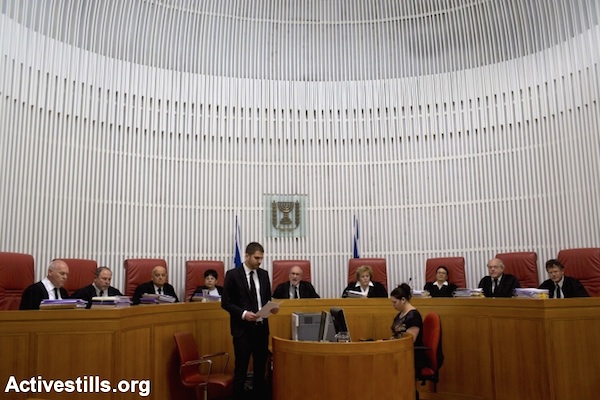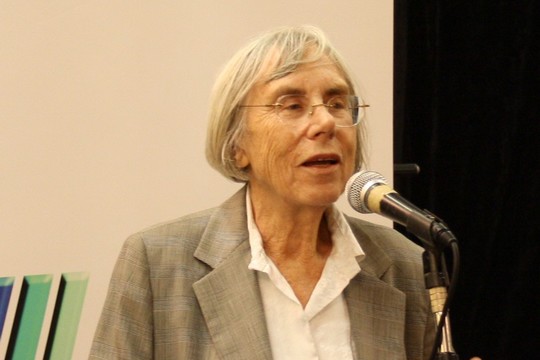A new report maps out the two separate legal systems in the occupied territories — one for Jews and one for Arabs. At a launch event for the report, senior jurists showed up and argued it’s not their fault whatsoever. Former Supreme Court Justice Dalia Dorner asked: What can we do? The answer: A lot.
(Translated from Hebrew by Ofer Neiman)

There was something mesmerizing about listening to representatives of the legal establishment speak at a conference held by the Association for Civil Rights in Israel (ACRI) last week. Mesmerizing and terrifying. The hardest thing was hearing Dalia Dorner — one of the most important judges in Israel, a recent candidate for the Israeli presidency, the president of the Israeli Press Council and an icon of sorts among the liberal camp — explaining that the Israeli Supreme Court actually has no influence on the reality of the occupation. In fact, she simply shirked all responsibility for the decisive role played by the judicial system in the establishment and consolidation of the military regime in the occupied territories.
But let’s start from the beginning. The conference, which took place last week at Tel Aviv University’s law school, was dedicated to ACRI’s new report, “One Rule, Two Legal Systems: Israel’s Regime of Laws in the West Bank.” The report systematically maps out what has become one of the main factors behind the reality in the occupied territories: the application of legislation on a national-ethnic basis. Jews reside in the West Bank as Israeli citizens, and Israeli civil law applies to them by virtue of a military order. Palestinians, on the other hand, are subjected to a full military regime, tried by military courts for any offense and denied the right to vote in the institutions that shape their lives.
The report provides a detailed account of this structural discrimination, which has become a pillar of the political and legal reality in Israel. The report also explains the significance of said discrimination on the lives of the Palestinian residents of the occupied territories — from the penal code, through planning and construction permits, down to traffic laws. Did you know, for example, that a police officer is authorized to rescind a Palestinian driver’s license or confiscate his or her vehicle upon issuing a traffic citation if they discover he or she has not paid a previous fine? According to ACRI, there is no parallel clause in Israeli law that applies to settlers. One road, one police officer, one offense, two drivers, and two different laws, regardless of any security questions. And we haven’t even addressed the disparity in freedom of movement, the right to a family life, the right to a livelihood and separate roads etc.
At last week’s conference senior legal scholars convened to discuss the report and its significance. The attorneys from ACRI, as well as leftist speakers, more or less said that without an end to the occupation, there can be no rectification of the structural discrimination, and vice versa. Nothing particularly new or surprising.
By contrast, it was both fascinating and disheartening to listen to the state spokespeople. One by one they asked “not to discuss politics,” explicitly admitted that the reality described in the report is based on deep, structural inequality between the populations and suggested marginal rectifications. Not a single one of them assumed true responsibility for their role.
For example, Aharon Mishnayot, former president of the Military Appeals Court in the West Bank, said that he was deeply troubled by the disparity between the two populations. Mishnayot told the crowd that he had even tried to use his limited tools in order to reduce this disparity in rights so that the legal status of Palestinians would gradually approach that of Israelis, citing as one example the establishment of a military court for minors.
Col. Doron Ben-Barak, the IDF’s legal advisor in the West Bank, welcomed the public discourse brought about by the report, and joined those who aspire for a gradual, prudent reduction of the disparity. Ben-Barak stressed that the solution could eventually come only from the political echelon.
Deputy Attorney General Dina Silber told the crowd that the State Attorney’s Office was often helpless in the face of cases in which the state simply disobeyed the law or decisions issued by the High Court of Justice, thus exacerbating offenses against Palestinians. Silber added that nothing could be done about this (+972 blogger Yossi Gurvitz rightly commented from the audience that her role as a civil servant was precisely to prevent the state from taking actions which violate the law, as well as to refuse to represent the State when it does so).
All the speakers ignored the fact that they are not just little cogs in the occupation machine, but rather the oil that keeps that machinery running, which is seemingly troubling to them. Troubling, but not to the extent that they would refuse to take part in the system. Their work, day by day and hour by hour, is to maintain the system, to take part in the political persecution of leaders and nonviolent activists and to fortify the mechanisms that remove Palestinians from their lands and allow for the expansion of settlements.
Authorized by the High Court of Justice

But the most extreme speech was Dalia Dorner’s. “We are just jurists, what can we do?” she asked. The former judge described the current situation as she understands it: there is a military regime in the occupied territories, there are settlements, there is a population there “that does not want us,” and there is a will to maintain “our security, [referring to] those who are sitting here in Tel Aviv.” If one accepts all this as fate, then what can the legal system actually do?
It seems that Dorner had not read the summary of the report that was at the center of the conference. In the report the Israeli judicial system is accused of having a tendency to refrain from discussing claims regarding discrimination or the illegality of the judicial separation policy. This means that the system has the ability to discuss these issues, yet chooses not to do so. Nothing is due to fate.
Dorner could have also recalled the active role played by the Israeli High Court in the perpetuation of the occupation. This is the very court on whose bench she served (she previously served as a judge with the rank of a colonel in the West Bank Military Appeals Court). It was indeed the High Court of Justice that legitimized the very existence of the settlements, the regime that props them up and the separation wall — all in violation of international law, as agreed upon by jurists around the world, including a ruling by the International Court of Justice.
As a military prosecutor said at my own trial (when I was indicted along with three friends for refusing the draft), it was the Israeli High Court that legitimized the targeted assassination policy; the administrative detention of Palestinians; the demolition of Palestinian homes as punishment for acts of terror committed by their relatives; the use of flechette shells (which spray out thousands of tiny and potentially lethal metal darts) in civilian population areas; the army’s policy of defending illegal settlements, and so on.
Dorner ignored all of this. “We are just jurists,” she said. Perhaps she should have watched Ra’anan Alexandrowicz’s “The Law in These Parts,” in which the army’s senior jurists (including former President of the Israeli Supreme Court Meir Shamgar) describe the pivotal role that they themselves played in putting together the orders, secret procedures, decrees and rulings that have laid the legal foundations for the existence of such a lengthy occupation, at the heart of which lie two separate legal systems.
The truth is that jurists, like all the professionals who maintain the occupation, can do a great deal. Just like architects, journalists, economists, hi-tech workers, entrepreneurs, real estate brokers and many others, they can refuse to accept the occupation’s anti-democratic nature. They can refrain from taking part in its mechanisms. Perhaps more than any other group, these jurists can challenge its legitimacy in public vis-a-vis Israeli society and the world. The mask of legitimacy and morality they provide this occupation, in tandem with “helplessness” self-justifications, is one of the more dangerous crimes that serve a regime based on separation and discrimination.
This article was first published on +972’s Hebrew-language sister site, Local Call. Read it in Hebrew here.
Related:
Israel’s newest Supreme Court justice and rule of law in Israel
Israel’s High Court chooses occupation over international law


